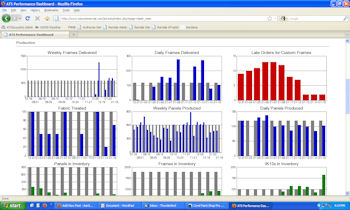Lessons from a Dashboard
I recently created a web-based dashboard for myself and my employees which we call the “Performance Screen”. It currently shows 23 measurements on simple bar charts including production volumes, employee attendance, customer satisfaction results, even how many pieces of scrap and trash are left on the production floor at the end of a day. Anyone in the company can view it from any computer. Here’s a partial screenshot:
Working from this screen, we’ve seen performance improvement in areas that have bugged me for a long time. Here are some lessons from my recent experience with this:
- Use specific, objective measurements. It’s hard to argue with numbers in black and white.
- Use technology to minimize cost of information. If it takes a lot of manual work for managers to pull together relevant performance data, it’s not going to happen often enough.
- Put a reminder system in place so measurements are taken and recorded even when management attention is focused elsewhere. In our case, to ensure consistency, our computer system requires employees to complete scheduled monitoring tasks before it allows them to clock out.
- Make short feedback loops. When changes in behavior are reflected on a chart the same day, reinforcement occurs much more effectively than when feedback comes at the end of the quarter.
- Keep records over time. The system has a better memory than I do, and that helps. As a manager, it’s hard for me to see trends and confidently and fairly grasp the overall picture without a clear record of performance over time.
- Encourage accountability through transparency. Because everyone in the company can see performance charts with a single click, attention is drawn to problem areas. And the system holds me accountable too. Confronting unacceptable performance is uncomfortable for me, but there’s no easy way out now, because flying under the radar is no longer an option for me, or for them.
- Use the data to make confident decisions. With clear, objective performance data I can act decisively with less hesitance about misjudging or being unfair. These confident actions as a manager are where the value happens.
The concept of short feedback loops was the thought that motivated me to go ahead and spend the time to develop this system. It came from Seth Godin’s book “Survival Is Not Enough” about the parallels between biological evolution and organizational change.
I’ll update you in the future as I learn more about the benefits and weaknesses of this type of management system.
What performance measures are key to your success? Can you put them on a dashboard?

